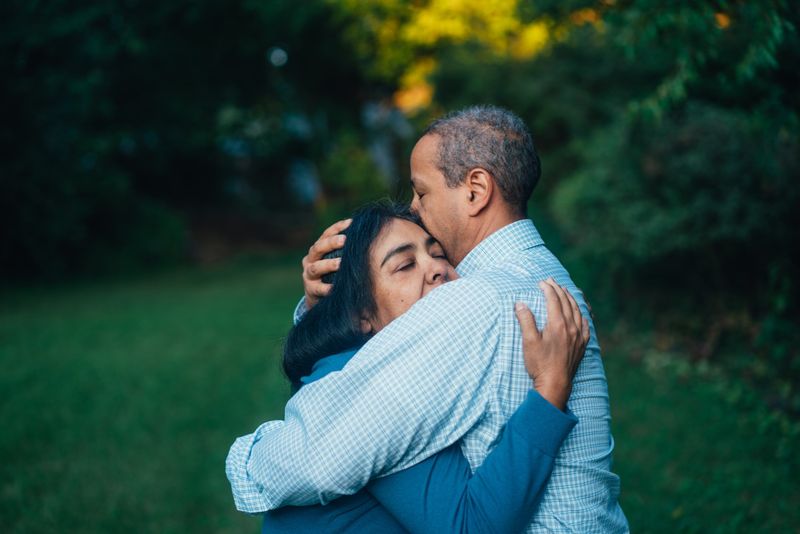Making the decision to end a relationship is never easy. It’s a choice that requires deep reflection and consideration. Before you make such a significant decision, it’s crucial to ask yourself some important, science-backed questions.
This blog post is designed to guide you through 18 questions that can offer clarity and insight. These questions aim to help you evaluate your relationship from different angles, ensuring that your decision is thoughtful and informed.
Take your time to ponder each one, allowing yourself to understand your emotions and motivations.
1. Are you emotionally safe in this relationship?
Emotional safety is foundational in any relationship. Consider if you feel secure sharing your true thoughts and feelings without fear of judgment or ridicule. Reflect on whether your partner respects your boundaries and emotional needs. If insecurity or fear is prevalent, it may be a sign to reevaluate your relationship’s dynamics.
Being emotionally safe means having the freedom to express yourself openly. It’s about knowing that your partner will listen and support you, even in disagreements. Without this, the relationship may lack a crucial component for growth and trust.
Think about moments where you felt emotionally vulnerable. Did your partner respond with empathy and understanding, or did they dismiss your feelings?
2. Do you trust their words—or just their potential?
Trust is a cornerstone of any relationship. Ask yourself if you trust your partner’s words and actions in the present, rather than an idealized version of what they could become.
Sometimes, we cling to the potential we see in a partner, hoping they will change or grow into someone different. This expectation can lead to disappointment if the reality doesn’t align with our hopes.
Reflect on past experiences: have promises been consistently kept, or are they often broken? Consider if your trust is based on tangible experiences or future expectations. Trusting only in potential can set up unrealistic pressures on both parties.
3. When conflict happens, do you feel respected afterward?
Conflict is natural, but the resolution process is what truly matters. Reflect on whether you feel respected and valued after disagreements. Are conflicts handled with maturity and mutual respect, or do they leave you feeling belittled or unheard?
Consider how arguments typically play out. Do they end with reconciliatory gestures or unresolved tension? The aftermath of conflict can reveal much about the health of your relationship.
Think about recent disagreements. Were your feelings acknowledged, or were they dismissed? A relationship where both parties feel heard and respected can weather many storms. It’s when conflicts spiral into disrespect that reevaluation becomes crucial.
4. Have you tried to reconnect—or just avoid the problem?
Reconnecting requires effort and willingness to address issues head-on. Ask yourself if attempts have been made to bridge emotional gaps, or if problems are ignored and left to fester.
Avoidance can lead to a buildup of resentment and distance. Reflect on whether past efforts to reconnect have been met with genuine engagement or mere avoidance.
Consider the current state of your relationship. Are there unresolved issues that have been swept under the rug? Meaningful reconnection requires active participation from both partners, not just passive coexistence.
5. Do you feel more like a partner or a project?
A healthy relationship should feel like a partnership, not a project. Consider whether your time is spent nurturing your connection or fixing persistent issues.
Reflect on your role in the relationship. Do you feel valued as an equal, or does it seem like your primary function is solving problems? A partnership involves mutual respect and contribution.
Think about times when you felt either uplifted or burdened by your relationship. If feelings of being a “project manager” outweigh those of being a partner, it might be time to reevaluate the dynamics. True partnership requires a balance of give-and-take.
6. Are your values still aligned—or drifting apart?
Shared values are the glue that holds a relationship together. Reflect on whether your core beliefs and priorities still align, or if they have begun to diverge.
Consider recent decisions or discussions: do you find yourselves agreeing on the big things, or are differences becoming more pronounced? Diverging values can create challenges if not addressed.
Reflect on important moments and whether they strengthened or tested your shared values. Alignment in values can foster deeper connection, while misalignment might be a sign of growing apart. Evaluate if your relationship supports your personal growth and beliefs.
7. Do you feel seen, or just tolerated?
Feeling truly seen by your partner is essential for an authentic connection. Examine whether you feel acknowledged and appreciated, or merely tolerated in your relationship.
Consider if your needs and desires are honored or overlooked. Feeling seen means being valued for who you genuinely are, not just what you represent in the relationship.
Reflect on interactions that made you feel invisible or cherished. Does your partner notice and celebrate your uniqueness? If you feel more like a fixture than a cherished partner, it’s time to reassess your relationship’s health.
8. Have you communicated your needs clearly—or only hinted?
Clear communication is key to fulfilling relationships. Ask yourself if you have directly expressed your needs, desires, and boundaries to your partner, or relied on hints and assumptions.
Often, we expect our partners to read between the lines, leading to unmet needs and frustration. Open, honest dialogues can prevent misunderstandings and build stronger connections.
Think about recent discussions: were your needs articulated clearly? A relationship thrives on transparency, not vague clues. Clear communication paves the way for understanding and mutual satisfaction. Evaluate if your communication habits foster clarity or confusion.
9. Does love feel mutual, or one-sided?
Mutual love is the heartbeat of a fulfilling relationship. Consider if affection and efforts are shared equally, or if one person is consistently giving more.
Reflect on how love is expressed and received. Is there a balance in emotional investment, or does one partner carry the weight? Shared love requires equitable contributions.
Think of times when you felt loved and supported. Are these feelings reciprocated, or is there a sense of one-sided devotion? Mutual love is essential for a healthy, enduring relationship. Assess if both partners are equally invested in nurturing the bond.
10. Can you name times when they took accountability?
Accountability is a sign of maturity and respect. Consider instances when your partner admitted mistakes and took responsibility for their actions.
Owning up to errors shows a willingness to grow and improve. Reflect on whether accountability is a regular practice or a rare occurrence in your relationship.
Think about moments when apologies were offered and changes were made. Accountability strengthens trust and fosters a supportive environment. Evaluate if your partner’s actions align with their words, as this consistency forms the foundation of trust and respect.
11. Is forgiveness being used as a reset—or a cover-up?
Forgiveness is vital for healing, but it shouldn’t disguise ongoing issues. Reflect on whether forgiveness in your relationship serves as a genuine reset or a mask for recurring problems.
Consider if apologies are followed by change, or if they are used to sweep issues under the rug. True forgiveness involves growth and resolution, not complacency.
Think about instances where forgiveness felt sincere or superficial. Is forgiveness fostering healing, or is it enabling patterns to persist? Genuine forgiveness is a path to healing, requiring both parties to engage in meaningful change.
12. Are you holding on for love—or fear of starting over?
Sometimes, the fear of the unknown can cloud our judgment. Ask yourself if you’re staying in the relationship out of love or fear of starting anew.
Reflect on what truly anchors you to your partner. Is it deep affection, or apprehension about change? Fear can often disguise itself as love, leading to a prolonging of dissatisfaction.
Consider your motivations and whether they are rooted in genuine connection or anxiety about being alone. Evaluating these feelings can provide clarity about the true nature of your commitment. Embrace the courage to discern love from fear.
13. Do you talk to your friends—or hide what’s going on?
Open communication with friends can provide valuable perspective. Consider whether you share your relationship struggles with trusted friends or keep them hidden.
Reflect on the reasons for your silence. Is it out of fear of judgment, or denial of the issues? Honest conversations with friends can shed light on your relationship from an external viewpoint.
Think about recent discussions with friends. Did you openly share concerns, or were you guarded? Sharing your experiences can help clarify your feelings and provide support. Trust in the insight that comes from those who know you best.
14. Are you growing—or shrinking in this relationship?
Personal growth is an essential component of a fulfilling relationship. Reflect on whether the relationship encourages your development or stifles it.
Consider how your partner supports your ambitions and personal growth. Are they a cheerleader or a detractor? A relationship should foster growth, not lead to stagnation.
Think about opportunities to learn and develop. Are they encouraged, or dismissed? Evaluate if your relationship allows you to flourish and become the best version of yourself. Growth should be mutual, enhancing both partners’ lives.
15. Is emotional labor distributed—or all on you?
Emotional labor involves managing feelings and relationships. Reflect on whether this responsibility is shared or falls predominantly on your shoulders.
Consider the division of emotional tasks like planning, organizing, and nurturing. A balanced distribution ensures both partners contribute to maintaining the relationship.
Think about past experiences where emotional labor felt equitable or lopsided. Does your partner participate in the emotional upkeep, or leave it to you? A fair distribution of emotional labor is crucial for a balanced, healthy relationship.
16. Do you dread the future—or just feel unsure?
The prospect of a shared future should inspire hope, not dread. Consider whether thinking about the future with your partner fills you with anxiety or excitement.
Reflect on your long-term vision and whether it aligns with your partner’s. Are there shared goals, or are paths diverging? Uncertainty is natural, but persistent dread may indicate deeper issues.
Think about discussions of future plans. Do they evoke enthusiasm or apprehension? A positive outlook on the future is essential for a thriving relationship. Evaluate if your relationship supports a hopeful, shared vision of what’s to come.
17. Have you talked to a neutral third party?
Sometimes, an impartial perspective can illuminate relationship challenges. Consider consulting a therapist or counselor to gain clarity and understanding.
A third party can offer unbiased insights, helping both partners navigate complex emotions. Reflect on whether professional guidance has been sought to facilitate communication and resolution.
Think about the benefits of counseling: has it provided new insights or resolutions? Engaging with a neutral third party can offer valuable tools to improve dynamics and foster understanding. It’s a proactive step towards relationship health and clarity.
18. What would you tell your best friend in this situation?
Imagine advising a close friend in your shoes. What advice would you offer them about staying or leaving a relationship?
Reflect on the wisdom you would share with someone you care about deeply. Often, advice to others mirrors what we need to hear ourselves. Honesty and compassion in this self-dialogue can reveal hidden truths.
Consider your gut feelings and instincts. What guidance arises when you think of a friend in your position? Trusting your intuition can provide clarity and direction in making heartfelt decisions. It’s about aligning actions with inner truth.



















